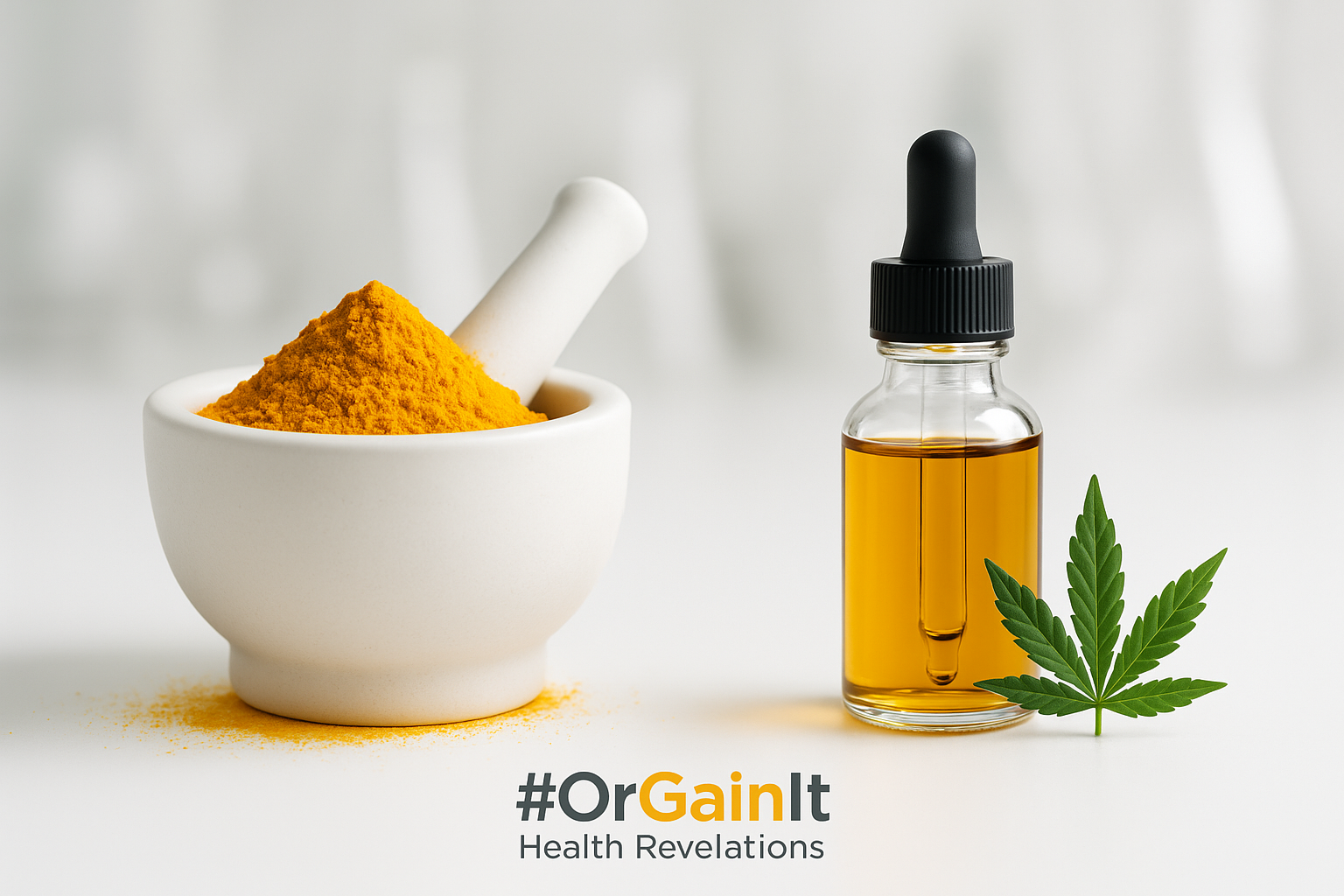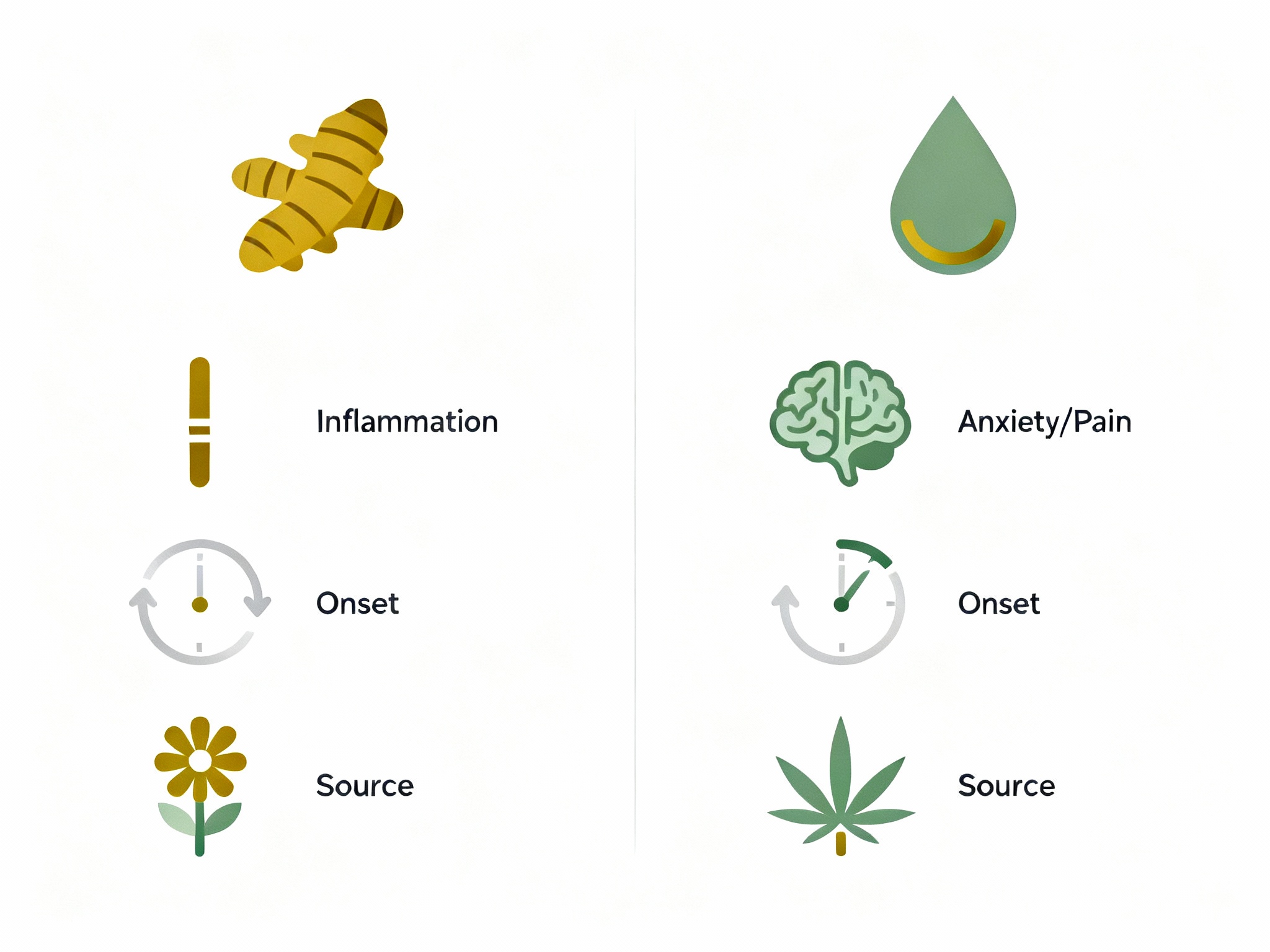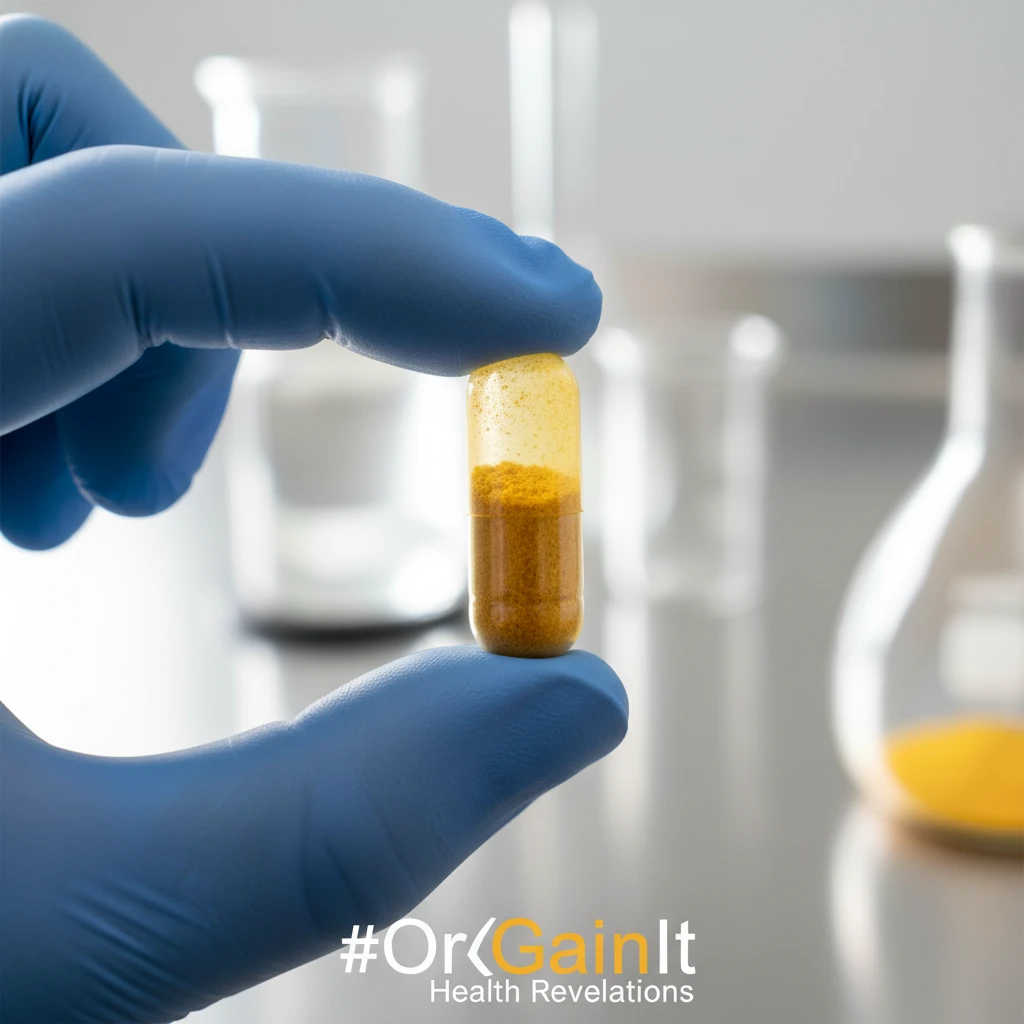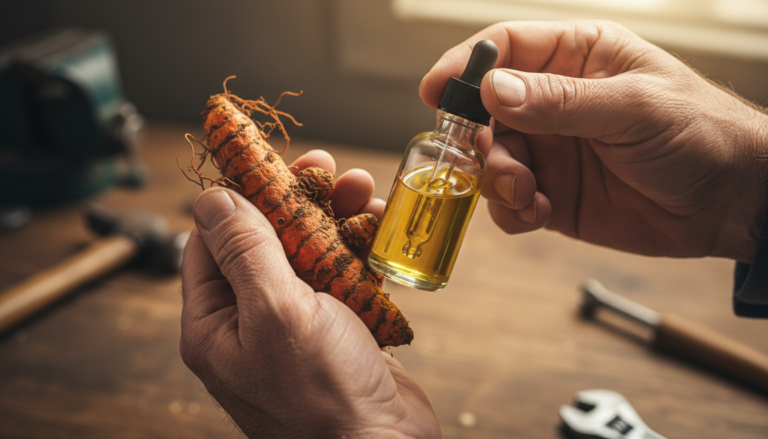Turmeric vs CBD: An Evidence-Based Comparison to Help You Choose
TL;DR: The Bottom Line
- Turmeric is for DEFENSE: Use it daily for long-term, body-wide anti-inflammatory support (ideal for conditions like arthritis). It works slowly and steadily.
- CBD is for OFFENSE: Use it as needed for fast-acting, targeted relief from anxiety, sleep issues, or nerve pain. It works quickly on your nervous system.
- Don’t think “vs.”, think “and”: They work differently and can be used together. Turmeric provides the foundation, while CBD offers on-demand support.
- Safety is Not Optional: Both can interact with medications. Always consult a doctor before starting, and only buy products with verified third-party lab tests.
In This Guide:
Hello, Robert Lees here. For years, I’ve dedicated myself to navigating the complex world of natural supplements, separating scientific fact from marketing fiction. Two of the most talked-about remedies to cross my desk are, without a doubt, turmeric and CBD. Both are powerhouses, celebrated for their health-promoting properties, but they are far from interchangeable.
I see the confusion every day. You’re looking for relief—from nagging inflammation, persistent pain, or the relentless hum of anxiety—and you’re faced with a choice. Do you opt for the ancient golden spice with millennia of traditional use, or the modern cannabis-derived compound that has taken the wellness world by storm?
This is more than just a simple choice; it’s about understanding how these substances work within your unique biology to achieve your specific health goals. The original version of this article was a good starting point. But science evolves, and so does our understanding. This is an expert update, designed to give you the clarity you deserve in 2025.
In this definitive guide, I will personally walk you through an evidence-based comparison. We will dissect their mechanisms, compare their benefits head-to-head for your biggest concerns, and honestly evaluate their safety profiles. My goal is to empower you to make an informed, confident decision.

Turmeric or CBD: A Quick Guide to Help You Decide
Before we dive deep, let’s start with a simple decision tree. I find this helps orient my clients and readers immediately, providing actionable advice right from the start.
Choose Turmeric If…
- Your primary goal is to manage chronic, low-grade inflammation.
- You prefer a remedy with a long history of culinary and medicinal use.
- You are looking for antioxidant support as part of a daily wellness routine.
Choose CBD If…
- You need relief from acute issues like anxiety, sleep problems, or specific types of pain.
- You are seeking a remedy that directly interacts with your body’s endocannabinoid system.
- You are comfortable with a newer supplement whose legality and regulation can vary.
Head-to-Head: A Snapshot Comparison of Turmeric vs. CBD
For a clearer picture, I’ve structured the core differences into this comparison table. Think of it as a cheat sheet for understanding their fundamental properties. This high-level view is essential before we get into the nuanced details of their effects.
| Feature | Turmeric (Curcumin) | CBD (Cannabidiol) |
|---|---|---|
| Primary Goal | Anti-inflammatory, Antioxidant | Anxiolytic, Analgesic, Sleep Aid |
| Mechanism | Modulates inflammatory pathways (like NF-κB) | Interacts with the Endocannabinoid System (ECS) |
| Best For | Chronic inflammation (e.g., arthritis), digestive health | Anxiety, sleep, neuropathic pain, epilepsy |
| Evidence Grade | Strong for inflammation; preliminary for others | Strong for epilepsy; moderate for anxiety/sleep/pain |
| Onset of Effects | Gradual (days to weeks of consistent use) | Faster (minutes to hours, depending on format) |
| Common Side Effects | Digestive upset at high doses, blood thinning | Fatigue, changes in appetite, diarrhea |
| Legal Status | Widely legal as a spice/supplement | Varies by location (hemp-derived vs. marijuana-derived) |

The Deep Dive: Comparing Benefits for Your Top Concerns
Now, we move beyond the summary and into the science. Understanding how these compounds work is the key to choosing the right one. For a more thorough exploration of the evidence, you can see my guide on the science behind turmeric and CBD, but here I will distill the most critical comparisons for your key health concerns.
For Inflammation Relief: A Battle of Pathways
Inflammation is where turmeric, or more specifically its active component curcumin, truly shines. Think of chronic inflammation as a slow, smoldering fire in your body that contributes to a host of diseases. Curcumin acts like a master firefighter. It works by blocking a molecule called NF-κB, which is a key activator that switches on the genes related to inflammation. By inhibiting NF-κB, curcumin effectively dampens the entire inflammatory cascade. This is why it’s so highly regarded for systemic, long-term inflammatory conditions.
CBD takes a different route. It interacts with our Endocannabinoid System (ECS), a vast network of receptors that helps maintain balance (homeostasis) in the body. CBD doesn’t bind to the main ECS receptors (CB1 and CB2) as strongly as THC does. Instead, it seems to work indirectly, possibly by preventing the breakdown of our body’s own endocannabinoids, allowing them to have a more significant effect. It also interacts with other receptors involved in inflammation, like TRPV1. While effective, its anti-inflammatory action is often seen as part of its broader, system-balancing effect, whereas curcumin’s action is more direct and targeted at the inflammatory process itself. For a deep dive on this, I recommend reading this review on cannabinoids as anti-inflammatories from the NCBI.
For Pain Management: Chronic Ache vs. Acute Pain
When it comes to chronic pain, the “best” choice depends entirely on the source of that pain. If your pain is driven by inflammation, such as the inflammatory pain from arthritis, turmeric is a logical first choice. By reducing the underlying inflammation over weeks and months, it can lead to a significant reduction in pain and an increase in mobility. It’s a long-term strategy, not a quick fix.
CBD, on the other hand, appears to be more effective for neuropathic pain—pain caused by nerve damage or dysfunction. This is a notoriously difficult type of pain to treat. Because the ECS is heavily involved in regulating pain signals in the central nervous system, CBD’s ability to modulate this system can provide relief where other remedies fail. It’s also useful for more acute pain or pain that has a strong anxiety component, as its calming effects can help break the pain-anxiety cycle.
For Sleep: Which One Actually Helps You Rest?
Many people reach for a supplement hoping for better sleep, and here, CBD has a more direct and researched advantage. The primary reason people struggle with sleep is often anxiety or a racing mind. CBD has demonstrated a clear ability to reduce anxiety, which in turn allows the body and mind to relax enough to fall asleep. Some research also suggests CBD may interact directly with receptors that govern the sleep-wake cycle. It doesn’t typically act as a sedative in the way a sleeping pill would; rather, it creates the conditions necessary for restorative sleep.
Turmeric’s role in sleep is almost entirely indirect. If pain and inflammation are what’s keeping you awake at night, then taking turmeric consistently could certainly improve your sleep quality over time. However, it has no known direct sedative or anxiolytic properties. It won’t calm a racing mind at 2 a.m. Therefore, for sleep, CBD is the more targeted and faster-acting option.
For Mental Wellness: Anxiety and Mood Support
This is another area where the distinction is clear. For direct anxiety and mood support, CBD is the front-runner. A significant body of evidence, from preclinical studies to human trials, supports its use for various anxiety disorders. It appears to work by modulating serotonin receptors (specifically 5-HT1A), similar to some conventional anti-anxiety medications. This makes it a powerful tool for managing situational stress and promoting a sense of calm.
Curcumin’s role in mental wellness is an exciting but much newer area of research. Some studies suggest it may boost levels of brain-derived neurotrophic factor (BDNF), which is crucial for neuron survival and growth, and low levels of which are linked to depression. Its anti-inflammatory action is also relevant, as neuroinflammation is increasingly understood to play a role in mood disorders. However, these effects are considered indirect and long-term. For immediate anxiety relief, CBD is the more appropriate choice.

Safety, Side Effects, and Drug Interactions
Natural doesn’t mean risk-free. As a responsible guide, I must insist that you approach both supplements with awareness and respect for their power. Before starting any new supplement, a conversation with your healthcare provider is non-negotiable.
The Risks of Turmeric You Should Know
Turmeric is exceptionally safe for most people at culinary doses. As a supplement, however, high concentrations of curcumin can present some issues. The most common risks of turmeric are digestive upset, nausea, or diarrhea, particularly at high doses. More importantly, curcumin has mild blood-thinning properties. If you are taking anticoagulant medications like warfarin, you must consult your doctor. Finally, turmeric is high in oxalates, which can contribute to kidney stones in susceptible individuals.
Understanding CBD’s Safety Profile
CBD is also generally well-tolerated, but it has its own set of concerns. The most common side effects are fatigue, changes in appetite, and diarrhea. The most significant concern, highlighted by the FDA, involves potential liver concerns at high doses. This is why starting low and going slow is crucial. Furthermore, CBD can interact with a family of liver enzymes called cytochrome P450 (CYP450), which are responsible for metabolizing many common prescription drugs. This is the same mechanism behind the “grapefruit warning” on many medications. This interaction can alter the levels of other drugs in your body, which can be dangerous. This makes a doctor’s consultation absolutely essential if you are on any medication.
“The single most important factor for safety with both supplements is quality. The market is unregulated, and contamination is a real risk. Always demand third-party lab results.”
This is a principle I stand by firmly. My own testing protocol is rigorous because purity and potency are paramount. Whether it’s an enhanced bioavailability form like Curcuwin or a full-spectrum CBD oil, you must verify what’s in the bottle.

Frequently Asked Questions
What are the main differences in effects between turmeric and CBD?
The main difference lies in their primary mechanism and speed of action. Turmeric (curcumin) is a powerful anti-inflammatory that works systemically and gradually over days to weeks to reduce chronic inflammation throughout the body. CBD interacts directly with the endocannabinoid system, making it faster-acting and more effective for acute, targeted issues like anxiety, sleep disturbances, and certain types of nerve-related pain.
When should I take turmeric instead of CBD for inflammation?
You should choose turmeric for managing chronic, systemic inflammation, such as that associated with osteoarthritis or general joint stiffness. It is best used as a daily supplement for long-term management to reduce the body’s overall inflammatory load, rather than for immediate, acute inflammatory pain from an injury, where CBD might offer faster, short-term relief.
Should I use turmeric or CBD for chronic pain?
It depends entirely on the type of pain. For chronic pain caused by underlying inflammation (like rheumatoid arthritis), turmeric is an excellent choice as it addresses the root cause over the long term. For neuropathic pain (nerve-related pain, shooting pains, or tingling) or pain that is amplified by anxiety, CBD is often considered more effective due to its direct interaction with the central nervous system and its calming properties.
How do I choose between turmeric and CBD for anxiety relief?
For direct anxiety relief, CBD is the clear choice. Its interaction with the endocannabinoid system and serotonin receptors has well-documented anxiolytic (anti-anxiety) effects, making it suitable for both generalized anxiety and acute stress. While turmeric may indirectly help improve mood over the long term by reducing neuroinflammation, it is not a primary or effective remedy for managing acute anxiety.
Why is turmeric gaining traction over CBD in 2025?
Turmeric is gaining traction for several key reasons. First, its legal status is clear and unambiguous globally, making it easily accessible. Second, it has a multi-millennial history of safe use and a vast body of scientific research backing its anti-inflammatory benefits. While CBD is immensely popular, ongoing regulatory ambiguity, quality control issues in a saturated market, and concerns about drug interactions remain significant hurdles for many consumers, leading them to seek out well-established, trusted alternatives like high-quality turmeric supplements.
My Final Verdict: Making an Informed Choice for Your Health
After reviewing the evidence and working with countless individuals, my conclusion is this: turmeric and CBD are not competitors. They are different tools for different jobs. The question isn’t “which is better,” but “which is right for you, right now?”
Think of **turmeric** as your foundational support. It’s the daily supplement you take to build a resilient, anti-inflammatory base. It works in the background, steadily protecting your body from the cellular stress and chronic inflammation that underlie so many health issues. It’s a long-term investment in your health.
Think of **CBD** as your targeted specialist. It’s the tool you reach for when you need more immediate, noticeable relief from a specific problem like anxiety, a sleepless night, or a flare-up of nerve pain. Its effects are more acute and direct.
Can they be used together? Absolutely. Many people find that using turmeric daily for foundational support while using CBD as needed for acute issues provides a comprehensive approach. This strategy of combining turmeric and CBD allows you to leverage the unique strengths of both. They can work in synergy, but it’s essential to approach this with care and professional guidance.
Ultimately, your health journey is your own. My role is to provide you with the most accurate, evidence-based map I can. Armed with this knowledge, you can now make a choice that is not based on hype, but on a genuine understanding of how these remarkable natural compounds work. Choose wisely, start with low doses, demand quality, and always, always listen to your body.






